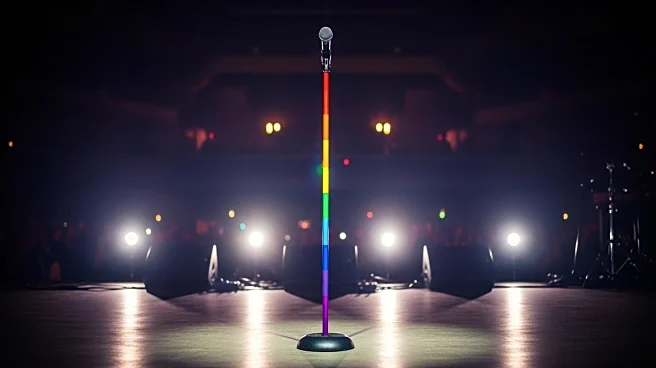What is the story about?
What's Happening?
Chappell Roan, a Missouri native and pop singer, recently performed in Kansas City as part of her 'Visions of Damsels and Other Dangerous Things' tour. The tour included stops in New York, Los Angeles, and Kansas City, with the latter being particularly significant due to Roan's roots in Missouri. Kansas City embraced the event by lighting up downtown buildings in pink, creating murals, and offering special menu items at local establishments. Roan's performances took place at the National WWI Museum and Memorial, featuring local drag performers and musical acts like Japanese Breakfast and Baby Tate. The event was a celebration of LGBTQ+ pride, with attendees showcasing their support through makeup, signs, and costumes.
Why It's Important?
The Kansas City tour stop is significant as it highlights the importance of representation and support for the queer community in the Midwest. Roan's decision to include Kansas City in her tour underscores the city's growing recognition as a hub for LGBTQ+ culture and acceptance. This event not only provided a platform for local performers but also fostered a sense of community and belonging among queer individuals in the region. By bringing attention to the challenges faced by the LGBTQ+ community in the Midwest, Roan's tour contributes to broader societal conversations about inclusivity and acceptance.
What's Next?
Following the success of the Kansas City tour stop, there may be increased interest in hosting similar events that celebrate and support the LGBTQ+ community in the Midwest. Local businesses and cultural institutions might continue to collaborate on initiatives that promote inclusivity and diversity. Additionally, Roan's tour could inspire other artists to consider the Midwest as a viable location for performances that engage with and uplift marginalized communities.
Beyond the Headlines
The event in Kansas City reflects broader cultural shifts towards greater acceptance and visibility of the LGBTQ+ community in traditionally conservative areas. It highlights the role of artists and performers in driving social change and fostering environments where diverse identities are celebrated. This development may encourage further dialogue about the challenges and triumphs of queer individuals living in the Midwest, potentially influencing public policy and societal attitudes.
















